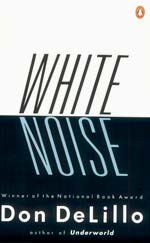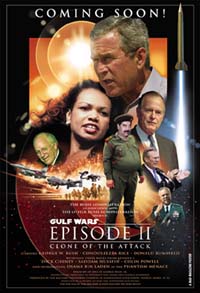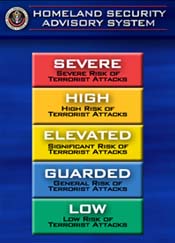OldSpeak
Welcome to the Age of Anxiety
By David McNair
May 05, 2003
In the summer of 1988, Bobby McFerrin's hit song "Don't Worry, Be Happy" was all over the airwaves. People loved its light, catchy melody and simple optimism in the face of hardship.
In every life we have some trouble
When you worry you make it double
Don't worry, be happy...
It went on to win a Grammy Award for Song of the Year and become a part of the American vernacular at the time. During George H.W. Bush's run for the presidency, it was even used as a theme song at the Republican Convention.
Boy does that seem like a long time ago.
These days, it's hard to imagine anyone seriously embracing a song like "Don't Worry, Be Happy." Faced with the cacophonic blitzkrieg of news, entertainment, and advertising that has become the narrative of life in 21st Century America, and amplified now by the war to an almost deafening level, such simple reassurances are as hard to believe as they are to come by. Instead, we seem to be taking our cues from the anxious, information-laden worlds that writers like Don DeLillo and Thomas Pynchon imagined.
 |
Concept-driven novels like DeLillo's White Noise and Pynchon's Gravity's Rainbow, which explore paranoia, entropy, and an obsession with death, are no longer esoteric entertainments for English grad students and conspiracy nuts. Nor are they whipping posts for critics who bemoaned the loss of soulful prose. Rather, they have become more or less accurate portraits of our society. As DeLillo said in a recent interview, living in America in the 21st Century "means to be worried, perhaps as never before. In the years of the Cold War there was danger, there was the danger that an enormous cataclysm might take place, affecting virtually everyone on the planet. The danger is different now. The danger is much more specific. The world isn't going to be destroyed, but you don't feel safe anymore in your plane or train or office or auditorium."
Indeed, during the Washington, D.C., sniper attacks it was impossible to pump your own gas in Virginia or Maryland without being worried, without imagining yourself in the crosshairs of a high-powered rifle, even though the odds of it happening to you were probably 10 million to one. And as the country watched the Elizabeth Smart case unfold, it was difficult for parents not to entertain the fear of a shadowy figure abducting their own children from the safety of their bedrooms.
The culprit here is not reality itself, but reality magnified by media gossip and warped by our own unsure footing in a society where information is hurled at us like precision weaponry. In a recent New Yorker piece, war correspondent Hampton Sides became not a casualty of war, but of information. Sides was one of a large group of journalists scheduled to be "embedded" in combat units as they entered Iraq. However, the information and training Sides received—which included complicated procedures for vaccinating himself through his chemical suit, lengthy, gory descriptions of the effect of chemicals agents on the body, and many allusions to the fact that the chances of surviving a chemical attack were close to nada, especially if you happen to puke in your gas mask—was so frightening and overwhelming that he freaked out and quit.
 |
Likewise, the informational shock and awe here at home has us all on edge. We are given "code-orange" alerts from the Office of Homeland Security and told to "be on guard." Our children practice "lock-down" drills at school. We are told to buy duct tape and plastic, and to watch out for anyone acting "suspicious." We are presented with entertainment-style news that presents war as if it were a game show, sporting event, or TV mini-series, with pro-active titles like "Showdown: Iraq." MSNBC's "Countdown: Iraq" title seemed to suggest that war was all but certain despite a majority of the world's opposition to it. You half-expect to see movie poster graphics introducing the news, like "Gulf War II: This Time It's Personal" complete with glorified headshots of Bush, Cheney, Powell, Rumsfeld, and Rice bursting out of a backdrop of war planes, tanks, soldiers, missiles, and explosions.
And, of course, there are the polls—endless, ever-changing polls meant to tell us what we are thinking (so that we don't have to?) though they change daily and are interpreted to serve every possible viewpoint. Then there is the parade of "experts" on TV talking over one another, pushed to abbreviate their views due to the time-constraints of TV programming, one of them jabbering away every time you turn on the TV. Sometimes these "experts" seem to be on different channels at the same time, as if they were being cloned or shuttled from one news studio to the next.
In today's scatter-shot world, it's sometimes necessary to process news of a local murder, the softness of laundry detergent, box office grosses, Michael Jackson's latest weird behavior, war, weather, and a barrage of car commercials in the space of 30 seconds. And the Internet, that circus of information, is flowing at the speed of thought. To dive in sometimes is to be trapped in a conversation that never ends; that never reaches a conclusion or a consensus; that presents the world as a crowded room with everyone talking at once. Like the characters in DeLillo's White Noise, we don't really know what's going on or who to believe, but at the same time we are painfully self-conscious and have a tendency to analyze everything to death. As a result, we tend to become enraptured by the things fighting for our attention—even comforted by them—as Jack Gladney in White Noise is sadly comforted by supermarkets:
"It seemed to me that Babette and I, in the mass and variety of our purchases, in the sheer plenitude those crowded packages suggested, . . . in the sense of replenishment we felt, the sense of well being, the security and contentment these products brought to some snug home in our souls—it seemed we had achieved a fullness of being."
Like rats in a laboratory experiment, we are constantly prodded, stimulated, studied, coaxed, drugged, seduced and spooked into buying what is currently being told, sold or forecast to us. We can feel the commercial and political strategies attempting to persuade or seduce us in one way or another. Our collective attention as fickle as a rat's weakness for cheese, we are like a crowd in a circus tent drawn lemming-like to the nearest freak-show.
Once upon a time, it wasn't this way...
On the eve of America's involvement in World War II, President Roosevelt gave radio addresses from the White House to sooth a nation, to quell fear, and to inspire people to face the struggles ahead. In 1939, after Hitler invaded Poland, FDR said:
It is of the utmost importance that the people of this country, with the best information in the world, think things through. The most dangerous enemies of American peace are those who, without well-rounded information on the whole broad subject of the past, the present, and the future, undertake to speak with authority, to talk in terms of glittering generalities, to give the Nation assurances: or prophecies which are of little present or future value...I hope the United States will keep out of this war. I believe that it will. And I give you assurances that every effort of your government will be directed toward that end. As long as it remains within my power to prevent, there will be no blackout of peace in the United States...
What's striking here is that FDR's soothing, intelligent and humble presentation makes the menacing rise of global fascism seem more manageable than finding a missing girl in Utah, tracking down a lone teenage sniper, stopping fanatics with box cutters and five hours of flight training, finding a bearded dude hiding out in a cave, or removing a militarily impotent Middle Eastern dictator from power. Maybe it was just the intimacy of it; FDR's lone voice crackling on the radio in our living rooms, unchallenged by 98 cable channels, safe from swarms of talking heads swooping down on us the moment he finished to tell us what he just said. Maybe it was simply a more innocent time.
 |
But I suspect it was more than that; here was a president speaking like a public servant and deferring graciously to the American people he served. ("You are, I believe, the most enlightened and the best informed people in all the world at this moment. You are subjected to no censorship of news; and I want to add that your government has no in formation which it has any thought of withholding from you.") Sure, FDR may have been holding back information, but the overall effect of his radio addresses was calming. In contrast, it's hard to imagine a modern American president—or any modern authority for that matter—advising the American people to "think things through." Today, it's about pushing buttons, as President Bush's address to Congress and the American people shortly after 9/11 demonstrates:
Our response involves far more than instant retaliation and isolated strikes. Americans should not expect one battle, but a lengthy campaign, unlike any other we have ever seen. It may include dramatic strikes, visible on TV, and covert operations, secret even in success. We will starve terrorists of funding, turn them one against another, drive them from place to place, until there is no refuge or no rest. And we will pursue nations that provide aid or safe haven to terrorism. Every nation, in every region, now has a decision to make. Either you are with us, or you are with the terrorists. (Applause.) From this day forward, any nation that continues to harbor or support terrorism will be regarded by the United States as a hostile regime.
Of course, FDR used similar fighting language after the Japanese attacked Pearl Harbor, but even then he was careful to reassure and calm. On December 9, 1941, he said:
We Americans are not destroyers; we are builders. We are now in the midst of a war, not for conquest, not for vengeance, but for a world in which this Nation, and all that this Nation represents, will be safe for our children....And in the dark hours of this day—and through dark days that may be yet to come—we will know that the vast majority of the members of the human race are on our side. Many of them are fighting with us. All of them are praying for us.
In contrast, President Bush's address is, well, ominous and creepy, isolating us from the rest of the world and suggesting that we will be plunged into perpetual war. Right or wrong, this is not the language of statesmanship, diplomacy, or public service that FDR used. This is the aggressive language of the boardroom, of corporatism, of marketing, of the sales pitch. Sell the product at all costs. Create offshore tax havens, move production overseas. Invest in the social science of marketing, aggressively lobby the government. Overwhelm people with the force of your sales pitch, fix your books and lie about your earnings—anything to make the value of your stock go up. Indeed, this language has infiltrated our culture and our politics so completely that those in authority don't even bother denying it. For example, when asked why the Bush Administration decided to wait until September 2002 to make its case against Iraq, White House chief of staff Andrew Card told The New York Times that "from a marketing point of view, you don't introduce new products in August.''
One is tempted to ask: Has the Information Age given birth to the Age of Anxiety? Has the science of marketing—or is it a philosophy—replaced authority in America? Must everything be sold to us? In a world where everyone knows about what's going on but nobody really understands what's going on, how does one maintain any cultural, political or spiritual equilibrium? And who is there to speak to us in calm, intelligent, measured tones about the things that matter to us most? Who's there to tell us, convincingly, "Don't worry, be happy?"
DISCLAIMER: THE VIEWS AND OPINIONS EXPRESSED IN OLDSPEAK ARE NOT NECESSARILY THOSE OF THE RUTHERFORD INSTITUTE.


